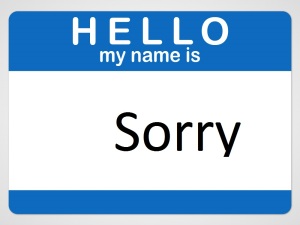I was encouraged by this report of Matt Chandler’s apology to Karen Hinckley. I don’t agree with Matt Chandler on a lot of things, but that apology? That’s how it’s done.
Logically, it’s so simple. Admit what you did. Listen to how it affected them. Apologize without qualification or an attempt to justify your behavior.
In reality, though, it’s a challenge to apologize in a way that doesn’t make it worse.
It’s hard to just say “I was wrong” without saying “But this is what I meant…so you’re also mistaken.” The latter statement has no place in a real apology. It reveals that the words “I’m sorry” were more of a compliance to others’ expectation of a mea culpa rather than personal recognition that an apology was in order.
It’s sometimes difficult to know when an apology is needed. As a woman (and to compound it – a woman raised Southern), “I’m sorry!” is a default I’m still trying to unlearn. I hate to cause offense. HATE. IT. So sometimes I apologize, but when I think about it later, there wasn’t really anything to apologize for. This happens most often when I’m being assertive (which is approximately 92% of the time – because INTJ) but because I’m female and we’re “supposed” to be nice and accommodating, it’s seen as aggression. Then I get mad, particularly when the person to whom I apologized is a male who is often verbally aggressive (I know – not all men. Not even most of the men I know. Let’s move on. Not everything is about you.) and sees no need to ever apologize for his behavior. I am learning that there are at least two sides to kind communication – the responsibility to speak as kindly as possible but also the responsibility to perceive others as kindly as possible. Both are important, because assuming the worst possible interpretation of someone’s behavior shuts down dialogue just as quickly as saying insensitive or thoughtless things does.
But eventually, it is pretty clear when I’m being tone-policed and when I’m being an ass. I am learning to assess the reality of my behavior regardless of its intention. Because that’s what counts. When I abuse or deny the privileges I have in society, it doesn’t matter if I’m merely doing it out of ignorance; it matters that I’m doing it. When I misjudge an interpersonal situation and react without full knowledge of the other person’s position (again – out of ignorance), it doesn’t matter that I didn’t intend to be wrong (and why would I ever intend that); it matters that I was.
A third side to kindness? Learning when and how to apologize.

Leave a comment